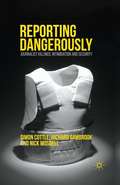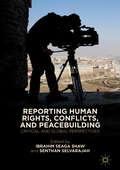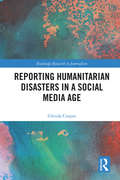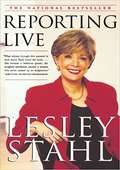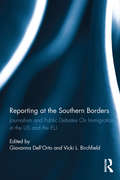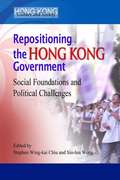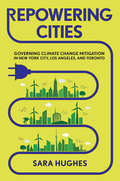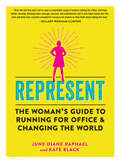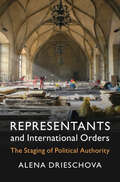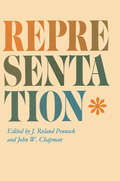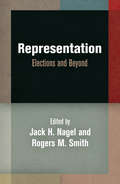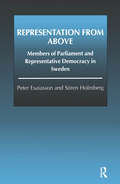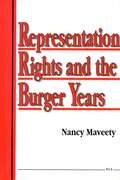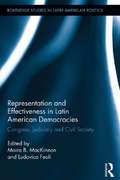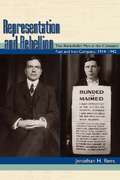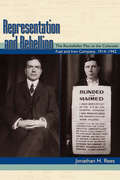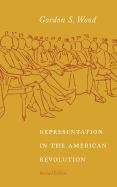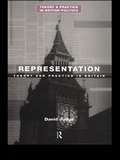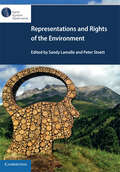- Table View
- List View
Reporting Dangerously: Journalist Killings, Intimidation and Security
by Simon Cottle Richard Sambrook And Nick MosdellMore journalists are being killed, attacked and intimidated than at any time in history. Reporting Dangerously: Journalist Killings, Intimidation and Security examines the statistics and looks at the trends in journalist killings and intimidation around the world. It identifies what factors have led to this rise and positions these in historical and global contexts. This important study also provides case studies and first-hand accounts from journalists working in some of the most dangerous places in the world today and seeks to understand the different pressures they must confront. It also examines industry and political responses to these trends and pressures as well as the latest international initiatives aimed at challenging cultures of impunity and keeping journalists safe. Throughout, the authors argue that journalism contributes a vital if often neglected role in the formation and conduct of civil societies. This is why reporting from ‘uncivil’ places matters and this is why journalists are often positioned in harm’s way. The responsibility to report in a globalizing world of crises and human insecurity, and the responsibility to try and keep journalists safe while they do so, it is argued, belongs to us all.
Reporting Human Rights, Conflicts, and Peacebuilding: Critical and Global Perspectives
by Ibrahim Seaga Shaw Senthan SelvarajahThis book focuses on the reporting of human rights in broadly defined times of conflict. It brings together scholarly and professional perspectives on the role of the media in constructing human rights and peacebuilding options in conflict and post-conflict environments, drawing on case studies from Europe, Latin America, the Middle East, Africa, and South Asia. It also provides critical reflections on the challenges faced by journalists and explores the implications of constructing human rights and peacebuilding options in their day-to-day professional activities. The chapters embrace a variety of theoretical, empirical and methodological approaches and will benefit students, scholars and media professionals alike.
Reporting Humanitarian Disasters in a Social Media Age (Routledge Research in Journalism)
by Glenda CooperFrom the tsunami to Hurricane Sandy, the Nepal earthquake to Syrian refugees—defining images and accounts of humanitarian crises are now often created, not by journalists but by ordinary citizens using Twitter, Facebook, YouTube, Instagram and Snapchat. But how has the use of this content—and the way it is spread by social media—altered the rituals around disaster reporting, the close, if not symbiotic, relationship between journalists and aid agencies, and the kind of crises that are covered? Drawing on more than 100 in-depth interviews with journalists and aid agency press officers, participant observations at the Guardian, BBC and Save the Children UK, as well as the ordinary people who created the words and pictures that framed these disasters, this book reveals how humanitarian disasters are covered in the 21st century – and the potential consequences for those who posted a tweet, a video or photo, without ever realising how far it would go.
Reporting Live
by Lesley StahlLesley Stahl's job offer from CBS came with an ultimatum - "if you can't start tomorrow, forget it" The year was 1972, and opportunities for women in network television were rare. With the same determination that would define her career, she promptly departed Boston, went to Washington, and began her ascent to the top of broadcast journalism. In a male-dominated world, Stahl established herself as a "scoopster" and a "door kicker," breaking some of the most important stories in Washington, including Watergate. She would cover the next three presidents, witnessing the disintegration of Jimmy Carter's presidency, the rise and fall and rise again of Ronald Reagan's, and the unpretentious, regular-guy quality of George Bush's. In telling her story, Stahl touches on themes that have defined the later part of this century: the changing role of the press in politics, television's coming of age, and the dilemma of the professional woman. With witty anecdotes, wise observations, and never a hair out of place, Stahl provides an insightful and entertaining look at her world and ours from behind the reporter's microphone.
Reporting Public Opinion: How the Media Turns Boring Polls into Biased News
by Erik Gahner Larsen Zoltán FazekasThis book is about how opinion polls are reported in the media. Opinions polls are not reported in the media as unfiltered numbers, and some opinion polls are not reported at all. This volume demonstrates how opinion polls travel through several stages that eventually turn boring numbers into biased news in the media. The framework offered in this book helps to understand how some polls end up in the news coverage, and which systemic biases abound in the news media reports of opinion polls. In the end, a change narrative will be prominent in the reporting of opinion polls which contributes to what the general public sees and shares. The findings cover journalists, politicians, experts and the public, and how they all share a strong preference for change.
Reporting at the Southern Borders: Journalism and Public Debates on Immigration in the U.S. and the E.U. (Routledge Studies in Global Information, Politics and Society)
by Vicki L. Birchfield Giovanna Dell’OrtoUndocumented immigration across the Mediterranean and the US-Mexican border is one of the most contested transatlantic public and political issues, raising fundamental questions about national identity, security and multiculturalism—all in the glare of news media themselves undergoing dramatic transformations. This interdisciplinary, international volume fills a major gap in political science and communication literature on the role of news media in public debates over immigration by providing unique insider’s perspectives on journalistic practices and bringing them into dialogue with scholars and immigrant rights practitioners. After providing original comparative research by established and emerging international affairs and media scholars as well as grounded reflections by UN and IOM practitioners, the book presents candid, in-depth assessments by nine leading European and North American journalists covering immigration from the frontlines, ranging from the Guardian’s Southern Europe editor to the immigration reporter for the Arizona Republic. Their comparative reflections on the professional, institutional and technological constraints shaping news stories offer unprecedented insight into the challenges and opportunities for 21st century journalism to affect public discourse and policymaking about issues critical to the future of the transatlantic space, making the book relevant across a wide range of scholarship on the media’s impact on public affairs.
Reporting the Road to Brexit: International Media and the EU Referendum 2016
by Anthony Ridge-Newman Fernando León-Solís Hugh O'DonnellThis edited collection brings together leading international scholars to explore the connection between Brexit and the media. The referendum and the activism on both sides of the campaign have been of significant interest to the media in the UK and around the world. How these factors have been represented in the media and the role of the media in constructing the referendum narrative are central to assisting the development in our understanding of how UK and global democracy is being manifested in contemporary times. This book explores these topics through presenting a wide range of perspectives from research conducted by leading international scholars, and concludes with an assessment of the potential democratic and international implications for the future. By grappling with a highly important and controversial topic in a comparative and varied way, the volume contributes to theoretical debates about the nature and role of the media in complex social, political and cultural contexts.
Repositioning the Hong Kong Government
by Stephen Wing-kai ChiuThe relationship between government and society in Hong Kong has become an intensely debated topic as the complexities of governance grow and the old strategies of consensus building without genuine public participation fail to satisfy. Lacking democratic credentials, the Hong Kong SAR government finds itself more and more limited in its capacity to implement policies and less able to rely on traditional allies. A society dissatisfied with old forms of governance has become ever more ready to mobilize itself outside of the formal political structures. This collection of essays by leading scholars examines the Hong Kong government's efforts to reposition itself under the pressures of globalization, economic and political restructuring and the rise of civil society. Drawing on changing theoretical conceptions of state, market and citizenship, 'Repositioning the Hong Kong Government' offers new interpretations of the problems of governance in Hong Kong and puts forward positive suggestions for resolving them.
Repowering Cities: Governing Climate Change Mitigation in New York City, Los Angeles, and Toronto
by Sara HughesCity governments are rapidly becoming society's problem solvers. As Sara Hughes shows, nowhere is this more evident than in New York City, Los Angeles, and Toronto, where the cities' governments are taking on the challenge of addressing climate change.Repowering Cities focuses on the specific issue of reducing urban greenhouse gas (GHG) emissions, and develops a new framework for distinguishing analytically and empirically the policy agendas city governments develop for reducing GHG emissions, the governing strategies they use to implement these agendas, and the direct and catalytic means by which they contribute to climate change mitigation. Hughes uses her framework to assess the successes and failures experienced in New York City, Los Angeles, and Toronto as those agenda-setting cities have addressed climate change. She then identifies strategies for moving from incremental to transformative change by pinpointing governing strategies able to mobilize the needed resources and actors, build participatory institutions, create capacity for climate-smart governance, and broaden coalitions for urban climate change policy.
Represent: The Unfinished Fight for the Vote
by Marc Favreau Michael Eric DysonRead about the electrifying and continuing fight for voting rights—and discover your place in it—in this dramatic exploration of American democracy, from renowned thought leader Michael Eric Dyson and widely celebrated author Marc Favreau. One of the most important and least understood true stories of our nation, the fight for representation is an ongoing and epic quest to build the democracy sketched out in the Constitution but unfinished in the twenty-first century. <P><P> With impeccable research and exhilarating prose, Represent tells the story of voting rights in the United States from the American Revolution up to the present day. Each chapter takes on a new battle between the forces of people power and forces opposed to it. Readers will meet champions of freedom, including formerly enslaved revolutionaries, a Chinese American teenager, a Lakota Sioux activist, Black World War II veterans, a Mexican American student, and others who fought for their right to vote. Drawing clear lines from then to now, Represent weaves this important struggle into a single American drama that will help readers understand our past, present, and future.
Represent: The Woman's Guide to Running for Office and Changing the World
by Kate Black June Diane Raphael“Over the last few years we’ve seen a remarkable surge of women running for office, and even better, winning. Running takes courage, passion, and commitment, but it also takes books like this. June and Kate have created a wonderful resource for women as they think about taking the leap.”—Hillary Rodham ClintonTurn “can I do this?” into “yes, I can!” Join the growing wave of women leaders with Represent, an energetic, interactive, and inspiring step-by-step guide showing how to run for the approximately 500,000 elected offices in the US. Written with humor and honesty by writer, comedian, actress, and activist June Diane Raphael and Kate Black, former chief of staff at EMILY’s list, Represent is structured around a 21-point document called “I’m Running for Office: The Checklist.” Doubling as a workbook, Represent covers it all, from the nuts and bolts of where to run, fundraising, and filing deadlines, to issues like balancing family and campaigning, managing social media and how running for office can work in your real life. With infographics, profiles of women politicians, and wisdom and advice from women in office, this is a must-own for any woman thinking of joining the pink wave.
Representants and International Orders: The Staging of Political Authority (LSE International Studies)
by Alena DrieschovaDifferent units of international politics, such as states or the church, cannot be present in their entirety during international interactions. Political rule needs to be represented for international actors to coordinate their activities. Representants (i.e. maps, GDP, buildings, and diplomatic and warfare practices) establish collective understandings about the nature of authority and its configuration. Whilst representants are not exact replica, they highlight and omit certain features from the units they stand in for. In these inclusions and exclusions lies representants' irreducible effect. This book studies how representants define the units of the international system and position them in relation to each other, thereby generating an international order. When existing representants change, the international order changes because the units are defined differently and stand in different relations to each other. Power is therefore defined differently. Spanning centuries of European history, Alena Drieschova traces the struggles between actors over these representations.
Representation
by John W. Chapman J. Roland PennockThis volume, offers the thoughts of twenty scholars on the theory, history, and practice of representation. Two developments make a new appraisal of this subject timely. One is the decision of the United States Supreme Court requiring representation to be democratic in the sense of affording every voter an equal voice in government. The other, that some governments that are not democratic, in the sense of having freely competitive political parties, are now,nevertheless, "representative."
Representation
by Rogers M. Smith Jack H. NagelIn any democracy, the central problem of governance is how to inform, organize, and represent the opinions of the public in order to advance three goals: popular control over leaders, equality among citizens, and competent governance. In most political analyses, voting is emphasized as the central and essential process in achieving these goals. Yet democratic representation encompasses a great deal more than voter beliefs and behavior and, indeed, involves much more than the machinery of elections. Democracy requires government agencies that respond to voter decisions, a civil society in which powerful organized interests do not dominate all others, and communication systems that permit divergent voices to be heard.Representation: Elections and Beyond brings together leading international scholars from a wide range of disciplines to explore the twenty-first-century innovations--in voting laws and practices, in electoral systems, in administrative, political, and civil organizations, and in communication processes and new technologies--that are altering how we understand democratic representation. Featuring twelve essays that engage with national, provincial, and municipal governments across three continents, this volume tackles traditional core elements of democratic representation, such as voting, electoral systems, and political parties, while also underscoring the ways in which beliefs and preferences of citizens are influenced, expressed, and aggregated and the effects of those methods and practices on political agendas and policy outcomes. In pinpointing deficiencies in contemporary democratic practices and possibilities for reform, Representation provides an invaluable roadmap to improve democratic representation in the twenty-first century.Contributors: André Blais, Pradeep Chhibber, Archon Fung, Jacob Hacker, Zoltan Hajnal, Matthew Hindman, David Karpf, Georgia Kernell, Alexander Keyssar, Anthony McGann, Susan Ostermann, Paul Pierson, Dennis Thompson, Jessica Trounstine, Mark E. Warren.
Representation From Above: Members of Parliament and Representative Democracy in Sweden
by Peter Esaiasson Sören HolmbergThis book uses Sweden as a test case to analyze how parliament and elected representatives function in a representative democracy. Despite the status of Scandinavian countries as perhaps the world’s most egalitarian societies, the book argues that the best summary characterization of Swedish representative democracy is an elitist system run from above. The book also argues that an individualist representational model is relevant to the Swedish setting and most likely, to other settings as well. Representative democracy is not just party-based democracy - not even in a country with strong and disciplined parties. The book takes a broad approach to the study of political representation. It integrates into a single analytical framework concepts and theories from neighbouring traditions such as legislative behaviour, opinion formation and interest organizations. The study is based on a comprehensive set of data, including three surveys of the Members of the Swedish Parliament, corresponding voter surveys and content analysis of mass media and parliamentary records.
Representation Rights and the Burger Years
by Nancy MaveetyMaveety argues that the Supreme Court under Burger revolutionized the constitutional view of political representation
Representation and Effectiveness in Latin American Democracies: Congress, Judiciary and Civil Society (Routledge Studies in Latin American Politics)
by Moira B. Mackinnon Ludovico FeoliLegislatures, the judiciary and civil society are important actors in representative democracies. In what ways and how well do they represent? And how effectively do they carry out their institutional and social roles? Both questions refer to the key dimensions of democracy analyzed in this book: representativeness and effectiveness, respectively. While they have been developed separately in scholarly work on institutions and regimes, there is little work considering them simultaneously, and on their interaction. Using quantitative and/or qualitative methods, contributions from top scholars in the field of legislatures, the judiciary and civil society examine these two concepts and their relationships in four Latin American countries: Argentina, Brazil, Chile, and Mexico. Designed to guide the reader through the complexities of this debate, each expert engages in a larger set of theoretical debates about different approaches to representation in each sphere. In doing so, they debate how effectively these spheres carry out their roles in each country: whether a congress is institutionalized, its accountability, and its performance as a lawmaker; whether a judicial system is independent, carries out oversight, and protects citizen rights; and the role of civil society in a representative democracy. Representation and Effectiveness in Latin American Democracies is a timely and welcomed contribution to the to the growing debate about the quality of democracy in Latin America, and the developing world more generally.
Representation and Its Discontents: The Critical Legacy of German Romanticism
by Azade SeyhanAzade Seyhan provides a concise, elegantly argued introduction to the critical theory of German Romanticism and demonstrates how its approach to the metaphorical and linguistic nature of knowledge is very much alive in contemporary philosophy and literary theory. Her analysis of key thinkers such as Friedrich Schlegel and Novalis explores their views on rhetoric, systematicity, hermeneutics, and cultural interpretation. Seyhan examines German Romanticism as a critical intervention in the debates on representation, which developed in response to the philosophical revolution of German Idealism.Facing a chaotic political and intellectual landscape, the eighteenth-century theorists sought new models of understanding and new objectives for criticism and philosophy. Representation and Its Discontents identifies the legacy of this formative moment in modern criticism and suggests its relevance to contemporary discussions of post-structuralism, orientalism, theories of textuality, and the nature of philosophical discourse.
Representation and Rebellion
by Jonathan H. ReesIn response to the tragedy of the Ludlow Massacre, John D. Rockefeller Jr. introduced one of the nation's first employee representation plans (ERPs) to the Colorado Fuel and Iron Company in 1915. With the advice of William Mackenzie King, who would go on to become prime minister of Canada, the plan - which came to be known as the Rockefeller Plan - was in use until 1942 and became the model for ERPs all over the world. In Representation and Rebellion Jonathan Rees uses a variety of primary sources - including records recently discovered at the company's former headquarters in Pueblo, Colorado - to tell the story of the Rockefeller Plan and those who lived under it, as well as to detail its various successes and failures. Taken as a whole, the history of the Rockefeller Plan is not the story of ceaseless oppression and stifled militancy that its critics might imagine, but it is also not the story of the creation of a paternalist panacea for labor unrest that Rockefeller hoped it would be. Addressing key issues of how this early twentieth-century experiment fared from 1915 to 1942, Rees argues that the Rockefeller Plan was a limited but temporarily effective alternative to independent unionism in the wake of the Ludlow Massacre. The book will appeal to business and labor historians, political scientists, and sociologists, as well as those studying labor and industrial relations.
Representation and Rebellion: The Rockefeller Plan at the Colorado Fuel and Iron Company, 1914-1942 (G - Reference, Information And Interdisciplinary Subjects Ser.)
by Jonathan H. ReesIn response to the tragedy of the Ludlow Massacre, John D. Rockefeller Jr. introduced one of the nation’s first employee representation plans (ERPs) to the Colorado Fuel and Iron Company in 1915. With the advice of William Mackenzie King, who would go on to become prime minister of Canada, the plan—which came to be known as the Rockefeller Plan—was in use until 1942 and became the model for ERPs all over the world.In Representation and Rebellion Jonathan Rees uses a variety of primary sources—including records recently discovered at the company’s former headquarters in Pueblo, Colorado—to tell the story of the Rockefeller Plan and those who lived under it, as well as to detail its various successes and failures. Taken as a whole, the history of the Rockefeller Plan is not the story of ceaseless oppression and stifled militancy that its critics might imagine, but it is also not the story of the creation of a paternalist panacea for labor unrest that Rockefeller hoped it would be.Addressing key issues of how this early twentieth-century experiment fared from 1915 to 1942, Rees argues that the Rockefeller Plan was a limited but temporarily effective alternative to independent unionism in the wake of the Ludlow Massacre. The book will appeal to business and labor historians, political scientists, and sociologists, as well as those studying labor and industrial relations.
Representation in Congress
by Kim Quaile Hill Hill, Kim Quaile and Jordan, Soren and Hurley, Patricia A. Soren Jordan Patricia A. HurleyRepresentation in Congress provides a theory of dyadic policy representation intended to account for when belief sharing, delegate, responsible party, trustee, and 'party elite led' models of representational linkage arise on specific policy issues. The book also presents empirical tests of most of the fundamental predictions for when such alternative models appear, and it presents tests of novel implications of the theory about other aspects of legislative behavior. Some of the latter tests resolve contradictory findings in the relevant, existing literature - such as whether and how electoral marginality affects representation, whether roll call vote extremism affects the re-election of incumbents, and what in fact is the representational behavior of switched seat legislators. All of the empirical tests provide evidence for the theory. Indeed, the full set of empirical tests provides evidence for the causal effects anticipated by the theory and much of the causal process behind those effects.
Representation in the American Revolution
by Gordon S. WoodFrom one of America's most celebrated historians, the Pulitzer Prize winner Gordon S. Wood, comes an early work whose relevance is undiminished. Originally published in 1969, now revised and with a new preface, Representation in the American Revolution examines the ways in which a government is created and how, in the face of great difficulties as well as great possibilities, its citizens are represented. Written immediately after the completion of Wood's Bancroft Award-winning The Creation of the American Republic, this book elaborates on issues also explored in that landmark work. The subject is one that lies at the heart of any discussion of democracy. Establishing a proper method of representation was a goal and measure of the American Revolution, or as Thomas Jefferson said in 1776, "the whole object of the present controversy. " A fine example of political and constitutional history, this timeless little book will serve as an excellent introduction to issues of representation for students in the fields of political science, as well as history and law.
Representation: Theory and Practice in Britain (Theory and Practice in British Politics)
by David JudgeThis book provides an excellent insight into the theory and practice of political representation, a concept that is central to the understanding of modern British politics. The book explores the key elements of representation and the inextricable connections between theory and the unique British representative tradition. Using extensive contemporary examples and key theorists, this book will be essential reading for students of British politics.
Representational Style in Congress
by Justin GrimmerThis book demonstrates the consequences of legislators' strategic communication for representation in American politics. Representational Style in Congress shows how legislators present their work to cultivate constituent support. Using a massive new data set of texts from legislators and new statistical techniques to analyze the texts, this book provides comprehensive measures of what legislators say to constituents and explains why legislators adopt these styles. Using the new measures, Justin Grimmer shows how legislators affect how constituents evaluate their representatives and the consequences of strategic statements for political discourse. The introduction of new statistical techniques for political texts allows a more comprehensive and systematic analysis of what legislators say and why it matters than was previously possible. Using these new techniques, the book makes the compelling case that to understand political representation, we must understand what legislators say to constituents.
Representations and Rights of the Environment
by Peter Stoett Sandy LamalleAttending to the 'Cry of the Earth' requires a critical appraisal of how we conceive our relationship with the environment, and a clear vision of how to apprehend it in law and governance. Addressing questions of participation, responsibility and justice, this collective endeavour includes marginalised and critical voices, featuring contributions by leading practitioners and thinkers in Indigenous law, traditional knowledge, wild law, the rights of nature, theology, public policy and environmental humanities.Such voices play a decisive role in comprehending and responding to current global challenges. They invite us to broaden our horizon of meaning and action, modes of knowing and being in the world, and envision the path ahead with a new legal consciousness. A valuable reference for students, researchers and practitioners, this book is one of a series of publications associated with the Earth System Governance Project. For more publications, see www.cambridge.org/earth-system-governance.
